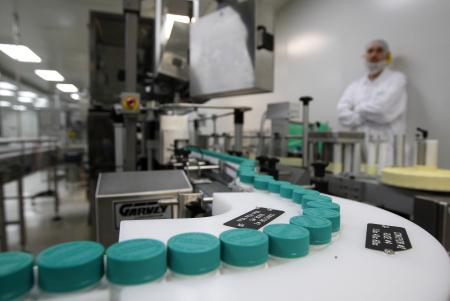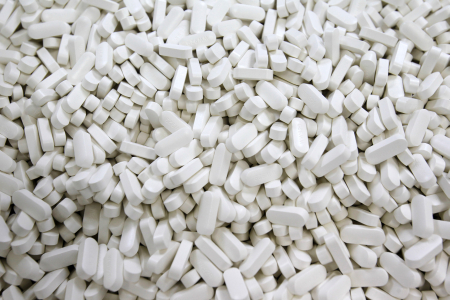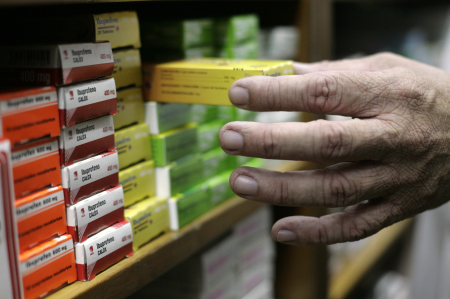Photographs: Reuters Bhupesh Bhandari in New Delhi
The government wants to extend price control in pharmaceuticals. At the moment, prices of 74 bulk drugs are controlled by the government, which brings 300 or so formulations (combinations of bulk drugs) on the "essential drugs" list also under control.
It wants to freeze the prices of these bulk drugs for a period of two years. And eventually, it plans to move from controlling bulk drugs to formulations.
This will bring all the 600 or so formulations on the "essential drugs" list under price control.
The move is prompted by the recent rise in the prices of medicines.
The issue needs to be looked at from the other end of the telescope too. Any product category is brought under price control when its makers report super-normal profits at the cost of the consumer.
If the evidence on the ground is anything to go by, the government's argument doesn't sound too convincing.
Numbers collated by the Business Standard Research Bureau show that the pharmaceutical sector's profits are more or less in line with those of business and industry.
In 2006-07, the net profit margin of pharmaceutical companies was 13.79 per cent, which was lower than the 15.08 per cent of the Nifty 50 companies (the most popular 50 stocks on the National Stock Exchange).
...
Say goodbye to cheap new drugs
Image: Pharmaceutical companies get up to a third of their business from exports.Photographs: Reuters
In 2007-08, the pharmaceutical margins improved to 15.45 per cent, which was higher than Nifty 50's 14.45 per cent.
In 2008-09, pharmaceutical margins fell to 6.91 per cent, way short of Nifty 50's 10.25 per cent. In 2009-10, pharmaceutical margins improved to 10.73 per cent but still lagged behind Nifty 50's 12.3 per cent.
In 2010-11, pharmaceutical margins gained further to close the year at 13.16 per cent, above Nifty 50's 11.57 per cent.
So, in the last five financial years, the pharmaceutical sector has outperformed other sectors of the economy on two occasions.
You could argue that in the last five years pharmaceutical companies have got fatter because their net profit margins have improved from 6.91 per cent in 2008-09 to 10.73 per cent in 2009-10 and 13.16 per cent in 2010-11, and hence there are grounds to introduce price controls.
But the numbers can be deceptive. Pharmaceutical companies get up to a third of their business from exports, which have a credit line of 180 to 360 days.
So, the cash profit, most of them will tell you, does not work out to more than eight or nine per cent.
These certainly do not look like super-normal profits.
...
Say goodbye to cheap new drugs
Image: There are over 20,000 registered pharmaceutical companies in the country.Photographs: Reuters
True, the West is moving towards price controls. Some governments have also ruled that the pharmacist is free to offer the patient a cheaper generic version (if one exists) of the patented medicine prescribed by the doctor.
But Western markets, and mature markets like Japan, are fundamentally different from India. Most people there are covered by medical insurance.
So, patients don't mind paying for expensive patented medicine.
As a result, the net profit margins of pharmaceutical companies there are as high as 20 to 25 per cent.
Here, in India, it was realised many decades ago that you cannot have inexpensive medicines with product patents.
So it was ruled that the country would recognise only process patents.
In other words, an Indian pharmaceutical company could produce any drug in the world, so long as it used a different process. Even this rule was very loosely observed.
Though India moved to product patents in 2005, the effects of the earlier regime are there for all to see.
There are over 20,000 registered pharmaceutical companies in the country. Every medicine has over 100 variants out in the market. Cartels are hard to form.
As a result, a five or six per cent share of the market has always been good enough for a company to become the leader. This has also ensured that prices remain low.
...
Say goodbye to cheap new drugs
Image: India is the world's most competitive pharmaceutical market.Photographs: Reuters
India, without a doubt, is the world's most competitive pharmaceutical market. Buyers of medicine are sensitive to prices because more than 80 per cent are uninsured - they pay from their own pocket.
In such a state of affairs, super-normal profits are indeed hard to make. Free markets prohibit premium pricing.
The Indian Pharmaceutical Alliance has said that the proposed price control will shave off almost Rs 3,000 crore every year from the industry's profit.
You could discount it as scaremongering by a lobby group. But even independent analysts have sounded alarm bells, and started to calculate the possible loss.
There are other issues that need to be sorted out. The industry is huge and varied in size and scale.
You have, at one end of the spectrum, large companies that do business worth thousands of crores in India and abroad.
At the other end, you have companies that operate out of holes in the wall.
Extensive price control will benefit these small companies that make minimal investments in technology, processes, research and market development.
...
Say goodbye to cheap new drugs
Image: New drug discovery research in the country has slowed down.Photographs: Reuters
Those with larger overheads stand to lose. It could be a serious deterrent for them to invest in processes and research.
As it is, new drug discovery research in the country has slowed down considerably in the last ten years or so.
India's promise of making new drugs at a fraction of the costs abroad (it can now cost in excess of a billion dollars) has gone more-or-less bust.
Stronger price controls will only make things worse.
Believe it or not, this is an industry with heavy-duty political undercurrents - the promise of cheap medicine and healthcare for the poor is one every leader finds too irresistible to make.







article